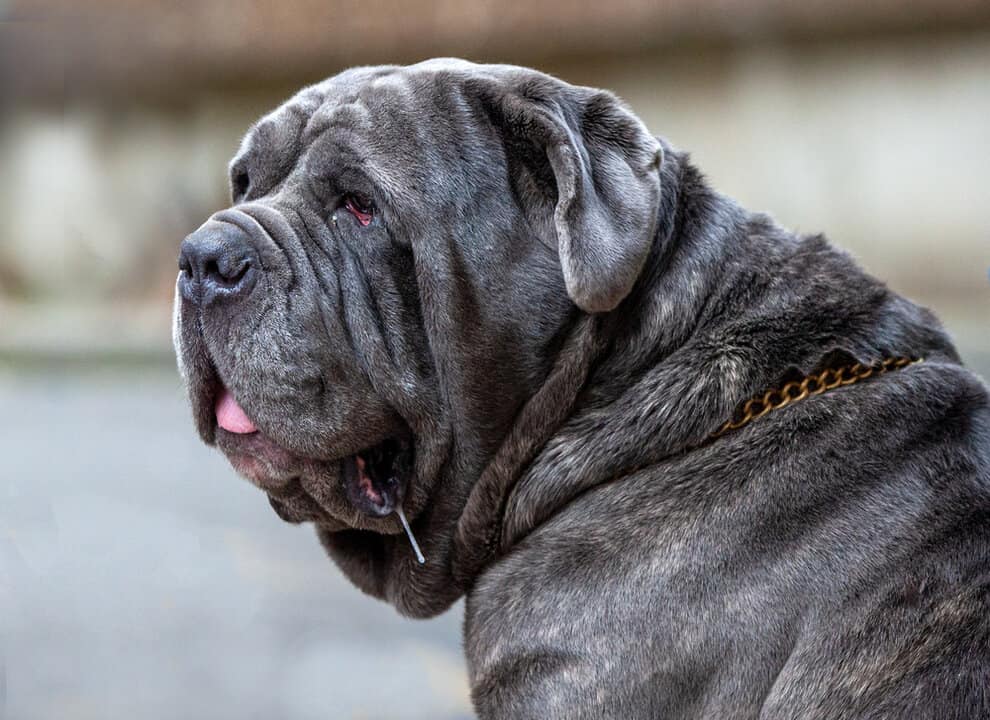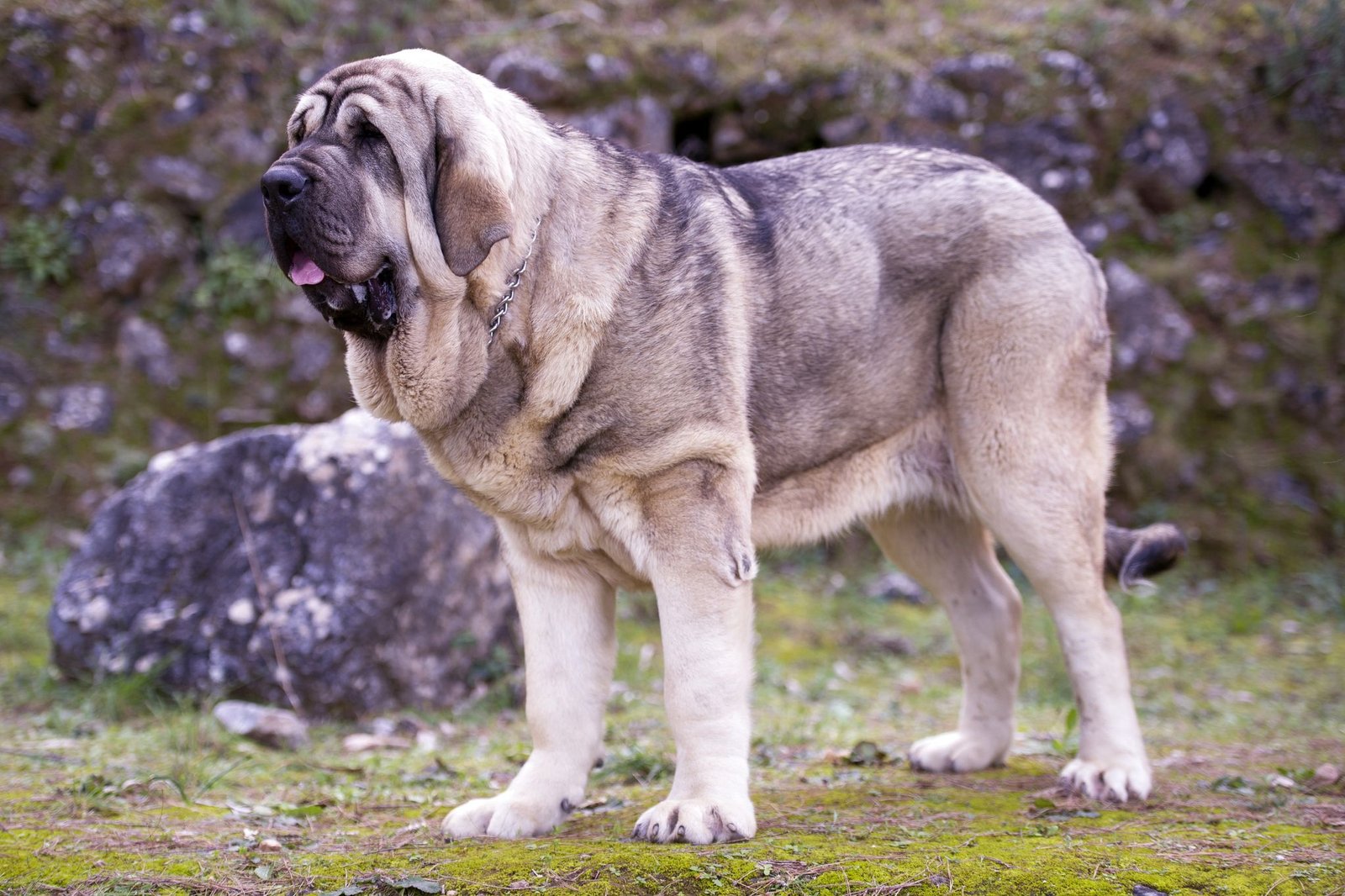The Spanish Mastiff is a gentle giant with a protective nature, known for being calm, gentle, and fiercely loyal. It is important to supervise them closely around children and other pets, as they can be territorial and aggressive towards strangers.
To care for a Spanish Mastiff, provide fresh water and a balanced canine diet, with two measured meals per day. They may benefit from a dog food formulated for large breeds. Early socialization and obedience training are crucial to ensure their well-being.
We will explore the characteristics, history, training, and care of the Spanish Mastiff, a breed that combines intelligence, beauty, and a noble disposition.
Introduction To Spanish Mastiffs
The Spanish Mastiff is a gentle giant known for its protective nature. This intelligent and noble dog breed is great with children and other pets, but early socialization is important. Learn more about their characteristics and care needs.
Overview Of The Breed:
The Spanish Mastiff, also known as the Mastín Español, is a large and noble breed that originates from Spain. This majestic dog is known for its impressive size and strength, as well as its calm and gentle nature. The Spanish Mastiff is highly regarded as a livestock guardian and is often used to protect herds from predators.
History And Origin:
The history of the Spanish Mastiff dates back hundreds of years and is deeply rooted in Spanish tradition. It is believed that the breed descended from ancient molosser-type dogs brought to the Iberian Peninsula by the Phoenicians and Romans. Throughout history, the Spanish Mastiff has been prized for its ability to protect livestock, especially sheep, from wolves and other predators.
Over time, the breed developed into a formidable guardian, known for its courage, loyalty, and protective instincts. Spanish shepherds heavily relied on the Spanish Mastiff to help them safeguard their flocks in the vast and rugged landscapes of the Spanish countryside.
In recent years, the Spanish Mastiff has gained recognition outside of its native country and has become sought after as a loyal companion and family guardian. Although still relatively rare in many parts of the world, this breed’s popularity is steadily growing.

Credit: betterpet.com
Characteristics And Temperament
The Spanish Mastiff is a gentle giant with a protective nature. They are generally good with children and other pets but need to be supervised around strangers. Early socialization and basic obedience training is important for this breed.
Physical Features
The Spanish Mastiff is an impressive and powerful dog breed with a distinctive appearance. Known for its large size, this breed stands tall and has a muscular build. The head is broad and massive, with a strong jaw and a noble expression. Their eyes are small, dark, and deeply set, adding to their intimidating presence. Their ears are medium-sized and hang down close to their cheeks.
The Spanish Mastiff has a double coat that provides protection in all weather conditions. The outer coat is dense, wiry, and rough, while the undercoat is soft and thick. Common coat colors include fawn, brindle, and wolf-gray. With their majestic and impressive appearance, these dogs are often admired for their beauty and unique characteristics.
Temperament And Personality Traits
The Spanish Mastiff is known for its calm and steady temperament. These dogs are generally very devoted and loving towards their families, making them excellent family pets. They are often described as gentle giants and are known for their patience with children. However, it’s important to note that proper supervision is crucial when interacting with kids due to their large size.
While they are devoted and protective of their families, Spanish Mastiffs can be wary and aloof with strangers. It is important to socialize them from a young age to ensure they become comfortable with different people and situations. Their natural guarding instincts make them excellent watchdogs, as they are always alert and quick to protect their loved ones.
When it comes to other animals, proper socialization is also important. Spanish Mastiffs can coexist peacefully with other pets, but introductions should be done gradually and under supervision. They have a tendency to be territorial and may show aggression towards unfamiliar dogs or animals entering their space.
These dogs are known for their intelligence and can be easily trained, although they may show some stubbornness at times. It’s essential to establish consistent and firm leadership while training them. Positive reinforcement methods, such as treats and praise, work best with this breed.
Care And Training
Proper care and training are essential for the well-being and happiness of your Spanish Mastiff. This majestic breed requires specific exercise and grooming requirements, as well as socialization and obedience training.
Exercise And Grooming Requirements
Regular exercise is important to keep your Spanish Mastiff healthy and maintain their strong physique. These dogs are large and powerful, so providing them with daily exercise will help prevent obesity and keep their muscles toned. Aim for at least one to two hours of exercise every day, which can include long walks, jogging, or playing in a securely fenced yard.
Additionally, grooming your Spanish Mastiff is crucial to keep their double coat in an optimal condition. Regular brushing will help remove loose fur and keep their coat shiny and free from mats. A thorough brushing session once or twice a week should suffice, but be prepared for more frequent brushing during shedding seasons. As with all breeds, regular nail trimming, ear cleaning, and tooth brushing should also be part of their grooming routine.
Socialization And Obedience Training
Early socialization is essential for Spanish Mastiffs to develop proper behavior and become well-rounded members of your family. Introduce your puppy to different people, animals, and environments to help them feel more comfortable and confident in various situations. This will also help prevent any aggression or fear-based behavior towards strangers.
Obedience training is also crucial for Spanish Mastiffs as they are naturally protective and may exhibit dominant tendencies if not properly trained. Start training your puppy as soon as you bring them home, using positive reinforcement techniques such as treats, praise, and rewards. Teaching them basic commands such as sit, stay, and come will ensure they can be safely controlled in any situation.
Remember, consistency, patience, and positive reinforcement are key when training a Spanish Mastiff. They are intelligent dogs that thrive on praise and rewards.
In conclusion, providing regular exercise, grooming, socialization, and obedience training are essential to care for and train your Spanish Mastiff. With the right approach and commitment, you can enjoy a loyal, well-behaved, and happy companion for years to come.
:max_bytes(150000):strip_icc()/spanish-mastiff-profile-treatment-3e038aa6c3a240e9b02b2226c1adec86.png)
Credit: www.dailypaws.com
Nutrition And Health
Diet and feeding guidelinesProper nutrition plays a vital role in keeping your Spanish Mastiff healthy and happy. When it comes to their diet, it’s essential to provide them with a quality, balanced canine diet specifically formulated for large breeds. Feeding them two measured meals per day ensures they get the correct amount of nutrition.
It is recommended to choose dog food that contains high-quality ingredients such as lean meats, vegetables, and grains. Avoid foods with artificial additives and fillers. Additionally, consult with your veterinarian to determine the appropriate portion sizes based on your Spanish Mastiff’s age, weight, and activity level.
Feeding Guidelines:
- Provide fresh water at all times to keep your Spanish Mastiff hydrated.
- Feed two measured meals per day to ensure your dog gets the correct amount of food.
- Choose a high-quality, nutritionally balanced dog food specifically formulated for large breeds.
- Avoid foods with artificial additives and fillers.
- Consult with your veterinarian to determine the appropriate portion sizes for your Spanish Mastiff.
While Spanish Mastiffs are generally healthy dogs, like all breeds, they are prone to certain health issues. It is essential to be aware of these conditions and take appropriate measures to prevent or manage them.
Common Health Issues:
| Health Issue | Description |
|---|---|
| Bloat (Gastric Dilatation-Volvulus) | A condition where the stomach fills with gas and twists, potentially leading to a life-threatening situation. Feed smaller, frequent meals and avoid vigorous exercise after meals to reduce the risk. |
| Canine Hip Dysplasia | A genetic condition where the hip joint doesn’t develop properly, leading to pain and mobility issues. Regular exercise and maintaining a healthy weight can help manage this condition. |
| Obesity | Spanish Mastiffs have a tendency to gain weight, which can put stress on their joints and lead to other health problems. Provide regular exercise and monitor their calorie intake to prevent obesity. |
| Heart Disease | Certain heart conditions, such as Dilated Cardiomyopathy, may occur in Spanish Mastiffs. Regular check-ups with a veterinarian can help detect and manage these conditions if they arise. |
Regular veterinary check-ups, a balanced diet, ample exercise, and maintaining a healthy weight are crucial to promoting the overall health and well-being of your Spanish Mastiff.
Living With A Spanish Mastiff
The Spanish Mastiff is a gentle giant with a protective nature. They are generally good with children and other pets, but supervision is recommended. Socializing them early and teaching them obedience commands are important for their temperament and behavior. Care involves providing fresh water, a nutritionally balanced diet, and feeding them twice a day.
Overall, the Spanish Mastiff is a loyal and devoted family companion.
Suitability As A Family Dog
The Spanish Mastiff is generally good with children and other pets, but it is important to supervise them closely at all times. They have a calm and patient temperament, making them suitable for families. However, due to their territorial nature, it is crucial to socialize them early on and teach them basic obedience commands. By doing so, you can ensure a harmonious environment for the entire family.
Handling Aggression And Territorial Behavior
The Spanish Mastiff can exhibit aggression towards strangers and territorial behavior. To prevent any unwanted incidents, it is essential to socialize them early and consistently. This will help them become more comfortable around unfamiliar people and situations. Moreover, teaching them basic obedience commands such as “sit,” “stay,” and “leave it” will provide you with better control in challenging situations.
Caring For Your Spanish Mastiff
When it comes to caring for your Spanish Mastiff, there are a few important things to keep in mind. Firstly, always provide fresh water for your dog. Additionally, feed them a high-quality, nutritionally balanced canine diet. It is typically recommended to feed them two measured meals per day to ensure they are getting the correct amount of nutrition. Consider using dog food specifically formulated for large breeds to meet their dietary needs.
Exercise And Mental Stimulation
In addition to basic care, Spanish Mastiffs need regular exercise and mental stimulation to remain happy and healthy. Engage them in daily walks and play sessions, which will help release their energy and prevent boredom. This breed is known for its strong guarding instincts, so incorporating activities such as obedience training, agility, or tracking can provide both physical and mental stimulation.
Providing A Safe And Secure Environment
Due to their protective nature, it is crucial to provide a safe and secure environment for your Spanish Mastiff. Ensure that your yard is properly fenced to prevent them from wandering off and encountering potential risks. Additionally, provide them with a comfortable and designated area within your home where they can retreat to when needed.
Healthcare And Regular Check-ups
Like any other breed, Spanish Mastiffs require regular healthcare and check-ups. Schedule routine visits to the veterinarian to monitor their overall health and address any potential concerns. Stay up to date with vaccinations, parasite prevention, and dental care to ensure your Spanish Mastiff’s well-being.
Conclusion
Living with a Spanish Mastiff can be a rewarding experience, especially when you understand their characteristics and provide them with the care they need. By socializing them early, handling their territorial behavior, and meeting their physical and mental needs, you can build a strong bond with this noble breed.
:strip_icc()/ScreenShot2019-04-19at2.07.38PM-1afa817e5d0b4a7aa5b3be7abd2425b7.png)
Credit: www.thesprucepets.com
Frequently Asked Questions For Spanish Mastiff: Dog Breed Characteristics & Care
Are Spanish Mastiffs Good Family Dogs?
Spanish mastiffs are good family dogs. They are gentle, loyal, and protective. However, they can be territorial and aggressive towards strangers. Supervision and early socialization are important. Spanish Mastiff: Dog Breed Characteristics & Care.
How Do You Take Care Of A Spanish Mastiff?
To take care of a Spanish Mastiff, provide fresh water and feed a balanced diet. Give two measured meals per day and consider a food formulated for large breeds. Socialize them from an early age and teach basic obedience. Supervise them with children and other pets due to their territorial and potentially aggressive nature.
What Is The Temperament Of A Spanish Bullmastiff?
The temperament of a Spanish bullmastiff is calm, intelligent, and loyal to its family. They can be wary of strangers and aggressive towards other dogs. It’s important to socialize them early and provide proper obedience training.
Are Spanish Mastiffs Friendly With Other Dogs?
Spanish mastiffs are generally friendly with other dogs of the same breed, but can be hostile towards stranger dogs. They have a good temperament with children, being calm and patient with them. It is important to socialize them early and supervise their interactions with other dogs.
Conclusion
The Spanish Mastiff is a gentle giant with a protective nature. They are known for their calm temperament, intelligence, and loyalty to their family. While they can be territorial and aggressive towards strangers, proper socialization and basic obedience training can help mitigate these tendencies.
Overall, the Spanish Mastiff is a great family dog but requires careful supervision and early training. Remember to provide them with fresh water and a balanced diet to keep them healthy. Consider the needs and characteristics of this unique breed as you welcome a Spanish Mastiff into your home.

